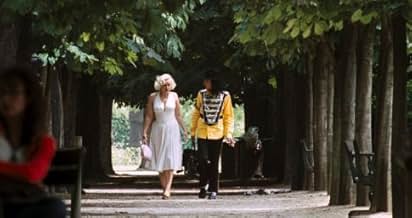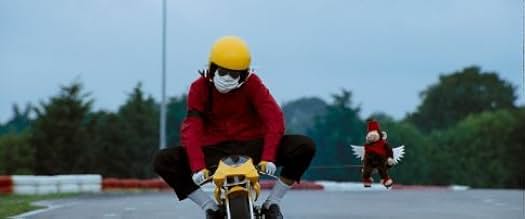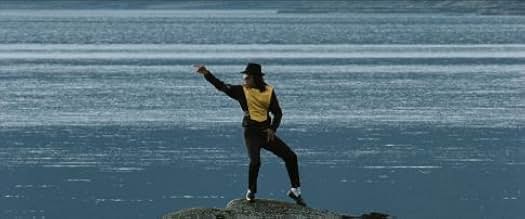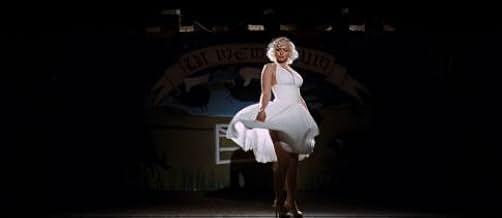A Parigi, un giovane americano che lavora come sosia di Michael Jackson incontra Marilyn Monroe, che lo invita nella sua comune in Scozia dove vive con Charlie Chaplin e sua figlia, Shirley ... Leggi tuttoA Parigi, un giovane americano che lavora come sosia di Michael Jackson incontra Marilyn Monroe, che lo invita nella sua comune in Scozia dove vive con Charlie Chaplin e sua figlia, Shirley Temple.A Parigi, un giovane americano che lavora come sosia di Michael Jackson incontra Marilyn Monroe, che lo invita nella sua comune in Scozia dove vive con Charlie Chaplin e sua figlia, Shirley Temple.
- Premi
- 2 candidature
- Buckwheat
- (as Michael Joel-Stuart)
Trama
Lo sapevi?
- QuizIn an interview with a newspaper in his hometown of Nashville, Tenn., Harmony Korine stated that he made several trips to Iceland to scout locations for the film. He ended up ditching that idea altogether and shooting the film in Scotland and France.
- BlooperThe shape of the nuns' parachutes are visible as they are falling from the plane.
- Citazioni
Michael Jackson: I don't know if you know what it is like to want to be someone else, to not want to look like you look, to hate your own face and to go completely unnoticed. I have always wanted to be someone else. I have never felt comfortable the way I am. All I want is to be better than myself, to become less ordinary and to find some purpose in this world. It is easier to see things in others, to see things you admire and then try and become that. To own a different face, to dance a different dance, and sing a different song. It is out there waiting for us, inviting us to change. It is time to become who we are not. To change our face and become who we want to be. I think the world is a better place that way.
- ConnessioniFeatured in Durch die Nacht mit...: Harmony Korine und Gaspar Noé (2010)
- Colonne sonoreMr. Lonely
Performed by Bobby Vinton
(p) 1962 Sony BMG Music Entertainment Inc.
Licensed courtesy of Sony BMG Commercial Markets (UK)
Written by Bobby Vinton / Gene Allen
Published by © 1962 Ripley Music Inc.
Licensed by Edward Kassner Music Co. Ltd
Used by permission, all rights reserved
Mister Lonely is a much more colourful film than anything associated with Korine. Its visuals (such as set design, camera angles and cinematography) are very pleasing, accentuated by its seemingly unrelated parallel narratives and absurdist premise. A Michael Jackson impersonator in France meets a Marilyn Monroe impersonator, who introduces him to a Scottish commune full of various impersonators. While superficially the film appears to be frivolous, clearly it has deeper social comments to make about identity, loneliness and alienation, issues the director has been reportedly grappling with personally.
The other narrative relates to a group of missionaries in Panama, with Werner Herzog portraying a priest, Father Umbrillo, delivering food aid by plane, assisted by various nuns. While the connection between the dual narratives is unclear, this story is strangely surreal, visually alluring and entertaining.
There is a small flat spot towards the end of the film, but for most of the film's 112 minutes, I had a big smile that was hard to wipe off my face. Charlie Chaplin, Shirley Temple, James Dean, Little Red Riding Hood, Queen Elizabeth, the Pope, The Three Stooges, Abraham Lincoln, Madonna and Buckwheat are all there.
The humour and irony are used with a clever and skillful blend of under- and over-statement. There is an underlying subtle sadness to some of the characters who, in spite of their eccentric alter egos, remain ordinary people that an audience can relate to. The film is intelligent and emotionally honest. One part is particularly close to the bone for me and brought tears to my eyes. This is Korine's most accessible and enjoyable film. It is full of originality and I highly recommend it.
- paulmartin-2
- 11 ago 2007
- Permalink
I più visti
- How long is Mister Lonely?Powered by Alexa
Dettagli
- Data di uscita
- Paesi di origine
- Lingue
- Celebre anche come
- Mr. Lonely
- Luoghi delle riprese
- Aziende produttrici
- Vedi altri crediti dell’azienda su IMDbPro
Botteghino
- Budget
- 9.500.000 USD (previsto)
- Lordo Stati Uniti e Canada
- 167.396 USD
- Fine settimana di apertura Stati Uniti e Canada
- 16.769 USD
- 4 mag 2008
- Lordo in tutto il mondo
- 407.674 USD
- Tempo di esecuzione1 ora 52 minuti
- Colore
- Mix di suoni
- Proporzioni
- 2.35 : 1
Contribuisci a questa pagina



































